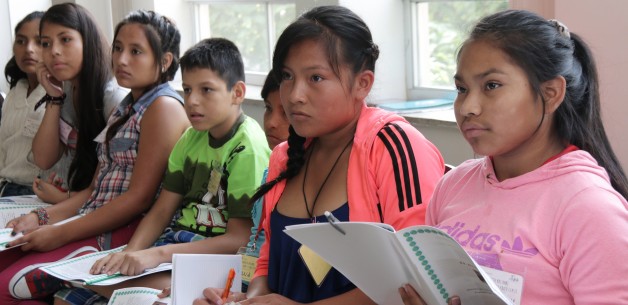Children in Peru attend BIC workshop on World Bank safeguards / BIC 2015
In August 2015 the World Bank flagged as one of the four goals of the safeguards review to “provide inclusive access to development benefits through the introduction of a non- discrimination principle.” In both the first and second drafts of the safeguards policies, that civil society consulted on, the non-discrimination principle referenced the need to prevent negative impacts of projects on disadvantaged and vulnerable groups. A footnote in the text listed a large number of groups, including children, persons with disabilities, and LGBTI individuals as among those that must have the ability to share in project benefits and to be specifically addressed in impact assessments by looking at differentiated impacts on each group. This represented a critical step forward and something a large number of civil society groups had called for and discussed with the Bank over the course of the four year review.
And yet, as the World Bank’s Committee on Development Effectiveness (CODE) is set to consider the final draft of the safeguards, civil society has learned, that all language defining disadvantaged and vulnerable groups, as well as any reference to specific groups that must be included when considering impacts on disadvantaged and vulnerable groups, has been removed from the draft and placed into a “directive”. Civil society and affected communities have not been permitted to review this directive and have no way to comment on this very significant change to the policies they have consulted on over the course of the past four years. This final draft will be considered by CODE on July 20th and the Bank has made clear that, only after that review, will it share the draft publically, less than two weeks before the new policies are expected to be approved in early August
The Bank has touted the review process as a particularly open one stating that the safeguards involved “the most extensive consultation the World Bank has ever had”. However, in the end, the portion of the policy directly addressing the most marginalized members of society is being rewritten in secret with no opportunity for the affected communities to comment on it. This represents part of a broader pattern of the World Bank excluding the most vulnerable while claiming that effective leadership to end poverty and boost shared prosperity should “raise the voices of the ultimate beneficiaries of government policy, especially the marginalized and the poor”.
Making this monumental change to the policies without allowing for any consultation with civil society calls into question the Bank’s interest in an open and transparent process that is responsive to the voices of the disadvantaged and vulnerable.

